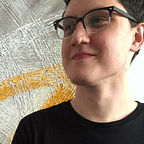Although Of Course You End Up Becoming A Zombie
Late at night, we tend to think the scary thoughts. Mine go like this: why can’t I commit to a career? And, what if I never make any money? Then, money won’t make me happy. Finally, I have no idea what I want. Those are just the appetizers. There are worse thoughts — you know the ones. Horrors we’ve all considered.
In high school I used to go to a theater in downtown Albuquerque to see my friends in improv shows. One time, after a show, a bunch of friends and I played a game called Zombie Tag in the empty theater. That’s where you turn off all the lights and whoever is ‘it’ shuffles around, moaning like a hungry beast, while everyone else hides. When the zombie finds someone in the dark, there is much shouting and gnashing of teeth. Then there are two zombies shuffling around, and so on, until no one is left.
It’s an immersive game. Just picture it — you’re crouched behind a desk in pitch darkness. Suddenly, a blood-curdling scream shatters the silence. Where is it coming from? Don’t move, don’t even breath, or they’ll hear you. All around, your friends are meeting grisly ends. It’s like falling headfirst into a horror movie.
I heard director David Cronenberg say in an interview that horror movies allow the viewer to explore the darkest aspects of life in a safe environment. “We’re born to test ourselves against what will come,” he says, ominously. What will come?
That’s what draws me to horror movies, and why I liked Zombie Tag. Sure, you’re alone and afraid, pulse racing, heart pounding, but deep down you know you’re safe. Those zombies are your friends. The threat is simulated, and that’s why you’re giddy, instead of terrified.
Even better is the relief of waking up from a nightmare that you were sure was real. In mine, I usually do something awful to someone I love. The scary thoughts take hold with a vengeance: What have I done? And, I can never fix this. When I wake up there is a moment of confusion, then the realization. It was just a dream! It didn’t really happen. No one will ever know what mischief I wrought. What was disastrous only moments ago is discarded, forgotten, and life goes on.
In a game of Zombie Tag, I don’t think you’d ever start thinking that the zombies were real, no matter how convincing your friends. It’s a lot more fun, however, if you act like it is. As moviegoers we call this the ‘suspension of disbelief’: the creative leap you take to get in the game. Sure, I’ll buy that people connected by wires can go into someone’s dream (Christopher Nolan’s Inception), or, sure, I’ll believe that teleportation was invented in 1986 (David Cronenberg’s The Fly). As long as we trust the director, we go with the flow.
Everyday life doesn’t require our suspension of disbelief, of course. Stuff just happens, and we react — no buying into the premise required. But, late at night, when the world has gone to sleep, we might allow ourselves to wonder how life got so… unbelievable. If life were a movie, we might find ourselves rolling our eyes here and there incredulously.
Take the example of falling in love. Why does it happen between certain people, and not others? Or at certain times and not others? It can feel like a torrential downpour inside, or it can feel like a gentle breeze. All the more remarkable that love can last. I’ve been dating someone for a long time, but somehow it just doesn’t get old. And, the most remarkable thing — it’s not like I’m creating my feelings of love. They just happen to me! What the hell is going on with that?
These are probably the kinds of thoughts that led Jonathan and Christopher Nolan to theorize that love is a natural law or phenomenon, like gravity, in their movie Interstellar (2014). “Love isn’t something we invented. It’s observable, powerful… the one thing that we’re capable of perceiving that transcends dimensions of time and space.” It’s kind of cheesy, and who knows what “transcends dimensions” means, but the lines work as a description of being in love. Haven’t a million other artists said the same thing? I’m sure these lines from 13th century Sufi poet Rumi would’ve sounded just as awkward: “Lovers don’t finally meet somewhere / they’re in each other all along.”
Life has its miracles. It also has the things that keep us up at night. Remember the first time you understood the idea of death? I remember lying in my bed as a boy, tears soaking my pillow as it suddenly sunk in: my parents won’t be around forever. Poor little Ross. And he didn’t even know the half of it — all the terrible things that David Cronenberg makes his movies about.
“We’re born to test ourselves against what will come.” We love the tests. It’s more fun if you act scared in Zombie Tag. It’s ecstasy when you wake up from a gut-wrenching nightmare.
Waking life trumps them both. The highs are higher, the lows are lower, and neither can be avoided. Shit happens. There’s no stopping it!
But, here’s the thing. With the fear of the inevitable we also get the excitement of not knowing exactly what will happen in the next moment. You don’t know what’s right around the corner! Nobody does. Could be the lake of boredom, the devastating inferno of loss, or the heavenly flurry of true love.
These are probably the kinds of thoughts that led author Jorge Luis Borges to say, “This world is so strange that anything may happen, or may not.” Who knows, maybe being a zombie will be great.
